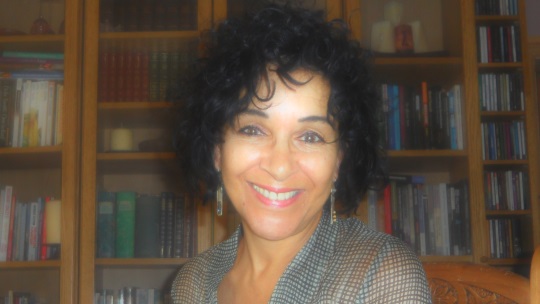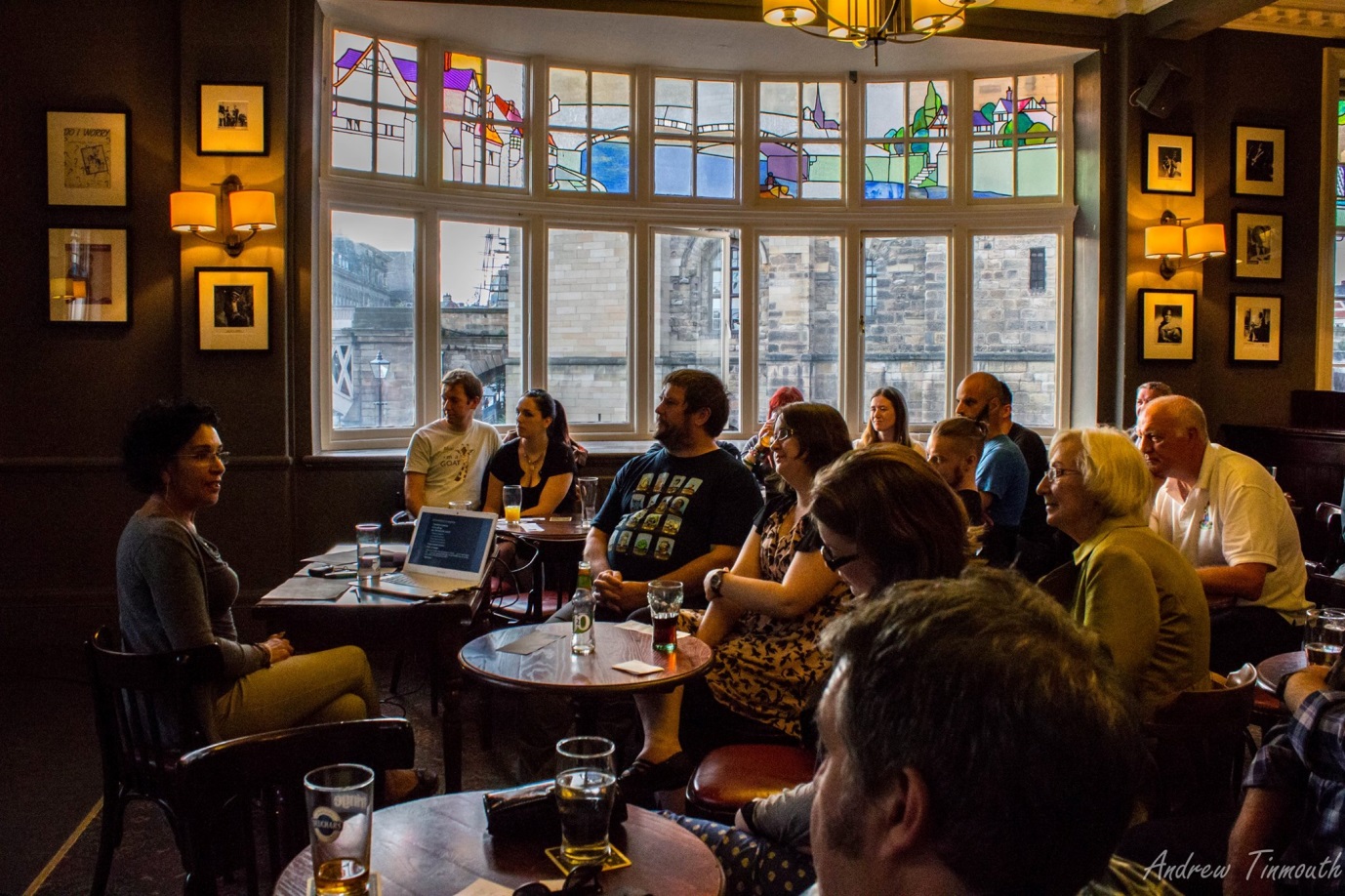Professor Elaine Campbell
Elaine Campbell is Professor of Criminology at Newcastle University in the School of Geography, Politics and Sociology. Elaine’s current theoretical interests centre on the post-political landscapes of plural policing. Plural policing denotes the mixed economy of contemporary policing, where responsibilities for crime control and the management of risk is dispersed across the private sector, the voluntary sector, the cybersecurity industries, and local communities. In this blog post, Elaine reflects on her night out with the Newcastle Skeptics in the Pub, over the course of which she explored alternative ways of policing paedophilia, and argued for an approach which she describes as `policing without boundaries’.
Ever fancied disseminating your research over a pint? I did just this at The Bridge, Castle Square, Newcastle Upon Tyne, in August 2014. Invited by the Newcastle Skeptics in the Pub to give a talk on my current research, Policing Without Boundaries, I was delighted to accept, and have been well-rewarded by an invigorating evening with an engaged, critical and attentive audience of Skeptics eager to learn more about my work. To create some context for the research focus, I started out by giving an overview of the shadowy world of paedophilia, and unpacked the secular demonology which has grown around this particular form of criminality. I went on to present a range of empirical data to illustrate how far paedophilia remains largely impervious to contemporary policing approaches which seek to map, control, manage and reduce (if not eliminate) its risks.

1/4 inch graph paper by David Swart: licensed under CC BY 2.0
I used a sheet of A3 graph paper as a prop to think about our reliance on a policing approach which centres on the surveillance, detection and investigation of paedophilia through, for example, the use of sex offender registers, CRB checks, chat room infiltrations, CEOP intelligence reports, computer forensics, and transnational, multi-sectoral policing partnerships. For me, this is a rather superficial way of going about things, and is a little like policing the two-dimensional space of graph paper. Put another way, it’s a policing strategy which imagines its operational topography as a flat surface upon which the incidence of paedophilia can be plotted, its impact measured, and its precise locations identified. Furthermore, it uses these co-ordinates to predict the movement and distances between different `paedophiliac events’, and mark out the boundaries for its containment. It’s a strategy which supposes that, with sufficient resources, time and technological know-how, paedophilia can be known, mapped, monitored, controlled and (eventually) expelled from the family home, the care setting, the community, the computer hard-drive, the chat room, and the network. Policing within boundaries is fine as far as it goes, and it should not be dismissed as unimportant, but perhaps there are alternative, more effective and complementary ways of tackling the issue.

Crumpled paper by Sherrie Thai: licensed under CC BY 4.0
This was the point at which I scrunched the A3 paper into a crumpled ball, and invited the Skeptics to look again at the policing terrain. In place of the Euclidian geometry of the A3 graph paper (and the policing within boundaries that it represents), we were now looking at the multiple landscapes of paedophilia. There are no fixed points here, or intersecting lines; marks on a graph which were separated are now brought together in close proximity; not everything is visible in this irregular and undulating terrain; there is no inside or outside, centre or margin. In short, where there is no objective form, it is impossible to map and measure content. This pretty much describes the clandestine world of paedophiliac offending. In common with human trafficking, drugs and arms smuggling, terrorism, and the illegal trades in human organs and endangered animals, paedophilia dissolves our sense of what is close by and what is far away. The crumpled paper demonstrates quite vividly that real-time encounters (in the home, in the youth club, at school) are co-extensive with distant connections (paedophiliac tourism, international paedophile rings, the circulation of child sexual abuse imagery, child sex trafficking). So, rather than rely on arrest data, online subscriptions, credit card usage, and sex offender registers, as indicators of the locations and extensive reach of paedophilia, our attention should turn to its emergence in and through intensive social relationships – entanglements and interactions which not only blur the distinction between here and there, but also collapse the imagined binaries of safety and danger, adult and child, the virtual and the real, the local and the global. I describe such an approach as policing without boundaries.

Rubber band ball by Chris Young: licensed under CC BY 2.0
It was then time for some tricks with rubber bands. I stretched two rubber bands as far as they would go, twisted them through each other, knotted them together, and then pulled them apart with a bit of a guitar twang. The key question here is not about the different shapes and patterns which these contortions produced, but how the elements (the hydrocarbons) of the rubber bands hold together when recombined in novel and inventive ways. A real-world example might help to make the point. The role-playing, online game, Second Life, hit the headlines when adult players were found to be engaging in simulated sex with child avatars. The elements of paedophiliac practice remain in place here – intentionality, soliciting, grooming, performed abuse, sexual gratification and exploitation – but have been virtually reassembled without any `real’ victims and `actual’ consequences. Like the rubber bands, there’s a durability about `the doing’ of paedophilia which is continually in the process of transformation and realignment – in this instance reinventing itself as a `victimless non-crime’.
But what does all this mean in terms of policing strategy? These are abstract ideas which need to be developed further before anything resembling a policy framework is on the cards. This is the challenge and the task for my research over the next year or so. A first step is to strengthen the theoretical credentials of policing without boundaries. The Skeptics certainly recognised in my talk, the familiar vocabulary and insights of assemblage, actor-network and topological theories. These frameworks enable us to focus on the intensive social and cultural entanglements of paedophilia `in the making’. How does the `doing’ of paedophilia bring spaces, bodies and things (such as homes, children, screens) together in ways which dissolve, shift, bypass and ultimately render irrelevant the boundaries within which policing currently tracks and apprehends offenders? Where should we be looking for paedophiliac offending, and what and who should we be looking at? This calls for an openness to the dynamics and contingencies of paedophiliac opportunities, a healthy skepticism of what we think we know about its whereabouts and prevalence, and an incredulity of pronouncements that paedophilia is being effectively managed and controlled. A good starting point is to acknowledge at outset that paedophilia creates the spaces of its own being. It draws its own maps.
I am extremely grateful to the Skeptics for affording me the time and space to work through and explore these issues in such a constructive and friendly environment. Their insightful contributions will certainly help me to refine my thinking, and take account of the different concerns which are threaded through contemporary anxieties about paedophiliac criminality. I have had very good feedback from the Skeptics, who commented that `the response has been overwhelmingly positive; I’m glad you enjoyed your time at the group too! One of the strongest areas is the Q+A/feedback section, so it’s great to hear how this will impact your research’. If you want to give your research a good airing, perhaps to test the water and see if your research ideas `have legs’; or perhaps to present work which is already well-established, then just get in touch with the Newcastle Skeptics in the Pub. Please visit their site for contact information, and to see full details of their activities, venues and programmes.
The theoretical strands of the research are being presented to an interdisciplinary audience in a sub-plenary at the ESRC-funded, CRESC Annual Conference, Power, Culture and Social Framing, University of Manchester, 3-5 September 2014; and at the Decentring Security: Policing at Home and Abroad workshop, organised and hosted by the Center for British Studies at the University of California, Berkeley in December 2014.


